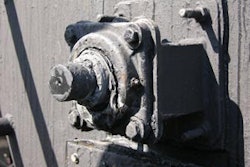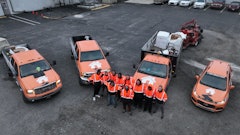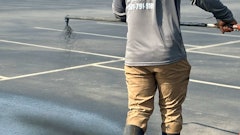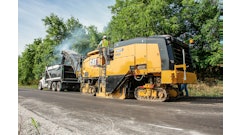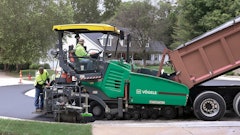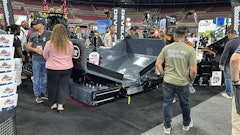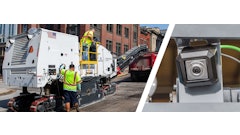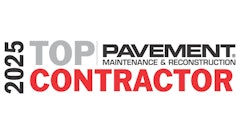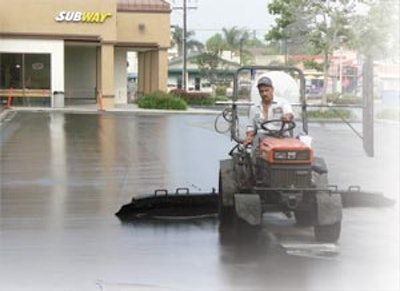
When Jim Bostick looks back on the origin and growth of J.B. Bostick, a West Coast pavement maintenance company, he can't help but feel some pride in what he and partners Jerry Hamlin and Tim Crowley have accomplished.
Started with $1,675 by Bostick in 1969, doing driveway repair and sealcoating out of the back of a pickup truck, J.B. Bostick today operates two independent divisions – in Anaheim and Roseville, CA – that in 2005 generated almost $30 million in sales.
"We started out small, very small, but through word of mouth we've expanded," Bostick says. "We're proof that you can have natural growth if you do a cut above for your customers and if you do what you say you're going to do.
"We have customers today, big property owners, that we started doing work for in 1970," Bostick says. "The reason we have them still is because we spoil them and treat them how we would want to be treated. It's that type of business philosophy, all about service and delivery, that has enabled us to grow. When you tell someone something, make it happen. No excuses. That's how we operate."
Dividing a big state
Initially J.B. Bostick operated only out of the Anaheim office, managed today by Jerry Hamlin, who has been with the company 27 years. The office employs about 60 people, 40 of whom work in the field. Hamlin says the Anaheim operation generates 90% of its sales from pavement maintenance work, including fabric overlays, sealcoating, pavement repair, patching, sealcoating, concrete work, and striping. The Anaheim operation generates all its work from shopping centers, industrial parks, apartment complexes, and homeowners associations, and has successfully mined an unusual niche – mobile home parks.
But California is a big state, and some of the clients J.B. Bostick worked with in Southern California also had properties up north. So in 1989 J.B. Bostick opened a northern California branch now run by Tim Crowley. The northern operation, based in Roseville has 35 employees.The northern division generates 60% of its sales from paving, 30% from sealcoating, and 10% from concrete work.
With the opening of the Northern California office J. B. Bostick is able to service clients throughout the entire state of California. The northern office also handles work in Reno, NV, while the southern location works in Las Vegas.
Mobile home parks
The two divisions operate independently, and do work a little differently, but both have a solid grip on the mobile home park market, which provides a solid and repeat core of business. Mobile home parks account for more than 50% of the work of the Anaheim operation and more than 25% of the work of the Roseville operation. Bostick says that combined the two divisions perform maintenance work on more than 250 mobile home parks each year.
Typically these parks feature roads, driveways, carports, and 200 to 400 individual coaches or modular units, each owned individually. The owner of the home rents the space from a property owner, who hires J.B. Bostick to maintain the pavement.
"Mobile home parks are the backbone of the company," Crowley says. "It's a special kind of work because you're working with numerous residences on a single property."
Much of the work in mobile home parks involves paving, but parks also are great proponents of ongoing pavement maintenance programs including everything from sealcoating and restriping to fabric overlays to complete removal and reconstruction. Hamlin says that recently much of the work involves pulverization of the existing asphalt, then blending the pulverized asphalt with the existing base and paving on that.
"A lot of the mobile home parks built 20 or 30 years ago were constructed right on top of native soil and that's why they're starting to fail significantly," he says. "Pulverizing them and blending into a new base and paving on top of that can bring these pavements up to standard."
Crowley says that 300,000-sq.-ft. to 400,000-sq.-ft. mobile home parks are not uncommon, and the work on them is done in 75,000-sq.-ft. to 100,000-sq.-ft. increments.
"Often the work is completed in phases, depending on what's needed at the moment," Crowley says.
J.B. Bostick has been successful in mobile home parks simply because they take care of each of the individual residents. "The owner of a mobile home is very meticulous," Hamlin says. "We took that as a challenge and our business has grown accordingly."
Crowley says each individual owner has his own concerns and needs, "just as we all do with our own homes, so the blow-and-go mentality is not going to work on this type of job."
He says J.B. Bostick succeeds in the mobile home pavement maintenance market because the crews pay special attention to whatever idiosyncrasies an individual mobile home owner might have, whether it's cleanliness, detail, landscaping, or noise.
"We believe in a neat, clean job and when we leave a job it looks like we weren't even there," Hamlin says.
Crowley says much of their success is related to scheduling as well.
"We address it well in advance, and help the manager notify the residents," he says. "A key to working on that type of property where there are so many people who will be directly affected is simply to make everyone feel comfortable with what's going to happen. Scheduling and paying attention to detail really helps."
In addition to scheduling and planning, the work is done cleanly.
"It takes more time to do it cleanly, so we take more time," Bostick says. "We make sure to edge by hand, for example. But this is all something our employees know to do."
Employees drive marketing
Finding and keeping employees is part of J.B. Bostick's approach to the business – and is the basis for their effective word-of-mouth advertising.
"We find the right people, train them how we need the work done, and then we keep them," Bostick says. "Keeping them with the company helps keep the quality up."
Bostick says the company works hard at presenting a distinctive, professional image, so all crew members wear uniforms. Equipment is well-maintained and is painted a striking bright black with yellow lettering, trimmed in charcoal grey, with chrome wheels, stacks, and bumpers.
"We have this image and the employees feel it and take pride in it," he says. "We look great on the street and get a lot of calls because of it."
Bostick says "appearance is important," retaining employees drives their success. He says they are able to retain employees because the employees are well paid, Bostick employs them through down months, having them maintain and repair equipment, and because they have a bonus program.
"We just don't believe in turnover," Bostick says. "A lot of companies panic at the end of a season and let people go because they don't have the work, but then they have difficulty rehiring those same quality people or quality people to replace them in the spring. We try to keep a good, tight unit year to year and our guys know what has to be done on a job and how it's supposed to be done and we don't even have to tell them."
Most employees have been with the company for more than 18 years, and to assist in retention the company started a profit-sharing bonus program in the early 1980s. The bonus is based on the company's profit and the length of service time of the employee.
"So it's an incentive for them to not only help the company profit but to perform well individually," Bostick says. "Attention to detail is critical. Our employees know that. They know what it takes to retain a customer and they realize how that can affect the company and their bonus."
"Quality is a big thing with us. It's huge," Hamlin says. "We work hard to always do quality work and that leads to happy customers, which results in strong word-of-mouth advertising. That's how we've grown."



